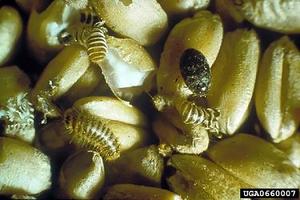Border securityCBP on the lookout for terrorists of a different kind – beetles
This fall customs agents at Chicago’s O’Hare International Airport are on the lookout for dangerous visitors of a different kind – diseases; during the fall hunting season, agents are particularly busy inspecting shipments for animal parts or wild game originating from countries in Europe, Africa, and Asia; animal hides, skulls, antlers, heads, or carcasses from exotic game like warthogs, ibex, and birds often carry pernicious exotic diseases like African swine fever, bovine spongiform encephalopathy, or Newcastle disease

Infestation of Khapra beetle with larvae // Source: zipcodezoo.com
This fall customs agents at Chicago’s O’Hare International Airport are on the lookout for dangerous visitors of a different kind – diseases.
During the fall hunting season, agents are particularly busy inspecting shipments for animal parts or wild game originating from countries in Europe, Africa, and Asia. Officials are especially keen on intercepting animal hides, skulls, antlers, heads, or carcasses from exotic game like warthogs, ibex, and birds as they often carry pernicious exotic diseases like African swine fever, bovine spongiform encephalopathy, or Newcastle disease.
In addition to diseases, agriculture inspectors are on the lookout for the Khapra beetle, one of the greatest foreign threats facing the U.S. food supply and economy. Agents are so wary of the beetle that an entire shipment can be rejected on the faintest suspicion that a beetle is present.
In August, customs officials in Chicago found the cast-off skin and larva of the Khapra beetle in two ten-pound bags of rice from India. The event sparked national attention as the last Khapra beetle infestation in 1953 took more than a decade and $15 million to control.
Last year agents spotted 100 Khapra beetles, compared to roughly ten per year for the last five years. Far from being an invasion, U.S. Customs and Border Patrol (CBP) explains that a new training program for agents is responsible for the dramatic increase in beetle discoveries.
To help prevent the entry of diseases or bugs, the U.S. Department of Agriculture and recently launched a traveler education campaign in Miami. With the “Don’t Pack a Pest” campaign, the agencies are encouraging international travelers to declare any food or plants they are bringing into the United States.
Under U.S. law importers must declare animal parts or products along with the proper documentation upon arrival in the country. Violators can be fined as much as $500,000 in extreme cases, but most penalties range from $1,000 to $3,000.
